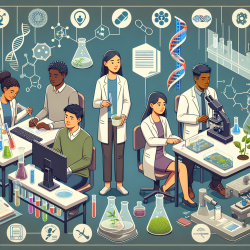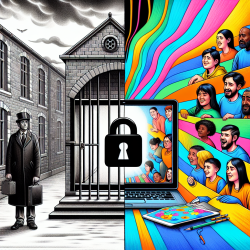Synthetic biology is an innovative field that leverages concepts from multiple disciplines such as biology, chemistry, physics, mathematics, engineering, and social sciences. The goal is to harness the diversity of biological functions to address societal challenges in agriculture, sustainable manufacturing, and medicine. However, training students in this field presents unique challenges due to its multidisciplinary nature.
Deconstructing Synthetic Biology Across Scales
The research article "Deconstructing Synthetic Biology Across Scales: A Conceptual Approach for Training Synthetic Biologists" presents a framework designed to address these educational challenges. This framework deconstructs biotechnologies across various scales—molecular, circuit/network, cell/cell-free systems, biological communities, and societal—providing students with a holistic toolkit for integrating cross-disciplinary concepts.
The Scales Framework
The scales framework is a conceptual tool that helps students understand synthetic biology technologies by breaking them down into components that function across different scales:
- Molecular Scale: Involves the understanding of individual molecular components like nucleic acids and proteins.
- Circuit/Network Scale: Focuses on collections of molecules interacting to perform higher-order functions.
- Cell/Cell-Free Systems Scale: Encompasses systems-level functions within biochemical environments.
- Biological Communities Scale: Includes multi-cellular interactions and community dynamics.
- Societal Scale: Considers the broader impact of technologies on society, including ethical considerations.
Implementing the Framework in Education
The framework has been implemented in courses at Northwestern University through a course-based approach that teaches students to deconstruct synthetic biology technologies across these scales. The course uses case studies and hands-on learning opportunities to engage students from diverse backgrounds.
Case Studies and Practical Application
The course includes case studies on environmental health (e.g., nitrogen-fixing bacteria), biochemical production (e.g., semi-synthetic artemisinin), and human health (e.g., CAR-T cell therapy). These case studies help students apply theoretical knowledge to real-world problems and understand the importance of integrating concepts across scales.
Benefits of the Multidisciplinary Approach
This approach offers several benefits:
- Holistic Understanding: Students gain a comprehensive view of how different scientific principles interact within synthetic biology technologies.
- Identification of Knowledge Gaps: Students learn to recognize where their expertise fits within a technology and identify areas for further learning or collaboration.
- Responsible Innovation: Emphasizing societal impacts encourages students to consider ethical implications early in technology development.
The Future of Synthetic Biology Education
The scales framework provides a foundational approach for training the next generation of synthetic biologists. By teaching students to think across scales, educators can prepare them for responsible innovation and collaboration in this rapidly evolving field. As synthetic biology continues to mature, further refinement and adaptation of this educational approach will be crucial.
To read the original research paper, please follow this link: Deconstructing synthetic biology across scales: a conceptual approach for training synthetic biologists.










